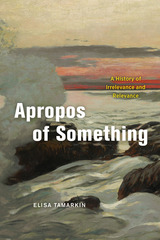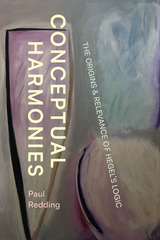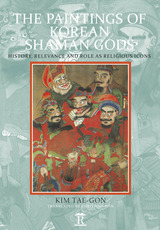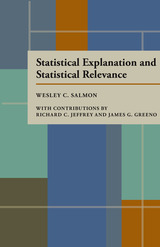
Before 1800 nothing was irrelevant. So argues Elisa Tamarkin’s sweeping meditation on a key shift in consciousness: the arrival of relevance as the means to grasp how something that was once disregarded, unvalued, or lost to us becomes interesting and important. When so much makes claims to our attention every day, how do we decide what is most valuable right now?
Relevance, Tamarkin shows, was an Anglo-American concept, derived from a word meaning “to raise or to lift up again,” and also “to give relief.” It engaged major intellectual figures, including Ralph Waldo Emerson and pragmatists and philosophers—William James, Alain Locke, John Dewey, and Alfred North Whitehead—as well as a range of critics, phenomenologists, linguists, and sociologists. Relevance is a struggle for recognition, especially in the worlds of literature, art, and criticism. Poems and paintings in the nineteenth century could now be seen as pragmatic works that make relevance and make interest—that reveal versions of events that feel apropos of our lives the moment we turn to them.
Vividly illustrated with paintings by Winslow Homer, Henry Ossawa Tanner, and others, Apropos of Something is a searching philosophical and poetic study of relevance—a concept calling for shifts in both attention and perceptions of importance with enormous social stakes. It remains an invitation for the humanities and for all of us who feel tasked every day with finding the point.

Conceptual Harmonies develops an original account of G. W. F. Hegel’s perplexing Science of Logic from a simple insight: philosophical and mathematical thought have shaped each other since classical times. Situating Science of Logic within the rise of modern mathematics, Redding stresses Hegel’s attention to Pythagorean ratios, Platonic reason, and Aristotle’s geometrically inspired logic. He then explores how later traditions shaped Hegel’s world, through both Leibniz and new forms of algebraic geometry. This enlightening reading recovers an overlooked stream in Hegel’s philosophy that remains, Redding argues, important for contemporary conceptions of logic.



It has been an ancient and tenacious human hope that mankind could apply to the no man's land between states the experience of domestic law in curbing violence and settling disputes. Within a society, the use of law to resolve disputes and contain violence centers in the courts and the police. Men anxious to restrain international aggression and settle international disputes peaceably have long sought to invoke international policing and adjudication under law. Twice within the past half-century, they have undertaken to build worldwide organizations to keep the peace. The United Nations system assigns a critical role to adjudication under the Charter and international law.
In this book, one of America's foremost legal scholars, who has extensive experience in foreign policy, administration, and international law, explores whether and to what extent decisions by international tribunals have been significant, or may yet be significant, for the settlement of international disputes. Mr. Katz believes that adjudication as an institution ranks among the great creative achievements of mankind, but it has its limitations--limits both in current practice and in its potential scope.
In presenting his argument; Mr. Katz concentrates upon the period since the end of World War II and deals primarily with international conflict within the experience of the United Nations and the International Court of Justice. He focuses on disputes resulting from the Cold War and on those between established industrial states and newly emerging states or peoples that have not yet attained a full measure of self-government.
In examining what happened and appraising what might have happened; Mr. Katz keeps the reader constantly aware of the many meanings of law; and of the need to sort out the different meanings in order to apply law effectively. Without an understanding of the effective reach and the limits of adjudication; he insists; we will waste opportunities for settling international controversies. We can waste opportunities by failing to use international tribunals where they can be effective; we can dissipate the precious resource of adjudication in wishful misapplications; and in misapplying adjudication; we can divert our attention from other ways and means more pertinent to the settlement of particular international disputes.

READERS
Browse our collection.
PUBLISHERS
See BiblioVault's publisher services.
STUDENT SERVICES
Files for college accessibility offices.
UChicago Accessibility Resources
home | accessibility | search | about | contact us
BiblioVault ® 2001 - 2024
The University of Chicago Press









